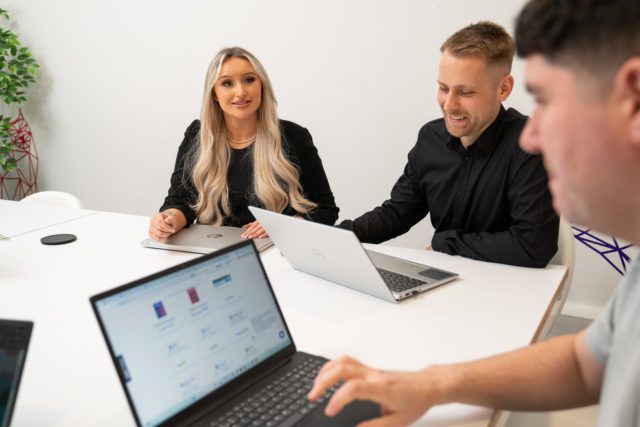There is no doubt that backlinks are a vital part of developing a website with authority in a Search Engine’s Results Page (SERP). When another user provides a link to your website online, this tells Google that your website is a popular place for people to visit to find the answer to their search query. However, building links is not the only method of improving keyword rankings. So, how else can you improve keyword rankings without link building?
There are many factors aside from backlinks that Google considers to be ranking factors. These include:
Keep reading to find out more about how link building works, and how to improve keyword ranking using methods other than link building.

To improve your keyword rankings, you first need to know where you currently stand. There are a number of tools online that can help you to get an idea of how you are ranking for certain keywords. Using tools like SerpApi, Advanced Web Rankings, SEMRush or Ahrefs, you can gauge how you are performing for the keywords that you are targeting.
While backlinks have a significant impact on how well your keywords will rank, they are not the only factor to consider when attempting to improve your keyword ranking.
A poor backlink profile typically tells Google that your website is not holding authority in your industry, and so will not look favourably on your website when positioning results to a query. It is important that the websites that are linking to your site are from reputable sources, with authority.
However, backlinks are the only way to improve keyword rankings…
Of course, link building is not the only way that you can show Google that you are a trustworthy and reliable source of information. Here are some ways that you can improve your keyword rankings without engaging in link building methods:
Have you done enough keyword research into what people are searching for and clicking on? Are you providing a solution to a common problem within your industry? Make sure you are spending enough time researching which keywords you should be targeting.
It is important that users find and enter your website, but it is also important that they stay, and find the answer that they are looking for with high-quality content. Ideally, people that enter your website will leave with more information than they were expecting to find, and potentially convert. This way, your website will gain authority as a hub of useful information.
How are your website’s core vitals performing? Is there anywhere that load times can be reduced? All of these signals are read by search engines, and will affect how your website is ranked.
While it may not be the first thing that people think of when they are trying to improve their keyword rankings, the crawling and indexing performance of your website can have a major impact on your website’s ranking.
On-page SEO can refer to a number of different factors such as internal links, organic click-through-rate, and user experience. Use a free tool such as SEO Quake to get an idea of where your website might be lacking in terms of on-page SEO.

To check your website’s backlink score for free, use a backlink checker. If you think your backlink profile need improving, you’ll be pleased to know that there are steps you can take to improve the links for your website:
Try directly contacting other websites that might provide a link to your website. If they add a link, this will give your website more credibility, and tell Google that your website is a reliable source of information. Likewise, you could target websites that currently link to your competitors, and ask for them to link to you.
It is important that backlinks come from websites that are trustworthy sources themselves. If you are receiving links from websites that are not considered by Google to be reliable, then they could be negatively impacting your ranking score.
This is a fairly easy option to improve your ranking. Simply provide a link to your website on your Facebook, Instagram, LinkedIn, Twitter, Pinterest, or any other profile that you have online.
By producing high-quality content, more people will trust your website to provide them with the information they are looking for. This should lead to people recommending your website to others online.
Submitting information that may be relevant for journalists to publish is a great way to build backlinks from reputable sources. Qwoted and #JournoRequest on X (formally known as Twitter) are great ways of doing this.

Here at Wildcat, our expert team is on hand for all of your SEO needs. Get in touch today to arrange a free consultation and see how we can help with your digital marketing strategy. Alternatively, why not check out our Knowledge Base pages for more answers to your SEO questions?

Founder
Our founder, Will Hitchmough, worked at a number of high profile Sheffield Digital Agencies before founding Wildcat Digital in 2018. He brings an extensive knowledge of all things related to SEO, PPC and Paid Social, as well as an expert knowledge of digital strategy.
Digital Marketing can be a minefield for many businesses, with many agencies ready to take your money without knowing how to deliver results. I founded Wildcat Digital to deliver digital success to businesses with smaller budgets in a transparent way.

Head of Growth
Rich joined us in May 2024 to head up our growth team. With years of experience helping other agencies to grow, Rich joins us at an exciting time as Wildcat is working on a five-year plan to become one of the biggest agencies in the UK.
Outside of work, Rich is a father to three children, which keeps him very busy! He’s also recently started running again to keep fit and loves a bit of DIY.

Head of Digital
Sarah joined Wildcat in January 2025, bringing over seven years of SEO expertise to the team. With a background in Fashion Communication and Promotion, she has worked both in-house and at agencies, covering a range of digital marketing specialisms before focusing on SEO.
Passionate about all things search, Sarah thrives on helping brands grow their online presence.
Outside of work, she enjoys walking her dog, running, and shopping for vintage clothing.

Office Manager
Amelia joined Wildcat Digital in January 2025, bringing extensive experience in HR, Health & Safety, Facilities Management and IT Support. Previously an Operations Manager at The University of Sheffield, she has a strong background in creating efficient and well-organized work environments.
Specialising in HR, Health & Safety, and Facilities Management, Amelia ensures the Wildcat Digital team has the resources and support needed to thrive. Whether managing office operations, maintaining compliance, or fostering a positive workplace culture, she keeps everything running smoothly.
Outside of work, Amelia loves trying new things, traveling, camping, and walking. She also enjoys socialising and exploring new places with friends and family. Her adventurous spirit and proactive approach make her a valued member of the team.

Client Success Coordinator
Siena joined us in 2023 with a background in sales and digital marketing. She leads on client relationships across the company, ensuring that our customers are happy throughout their journey with us, from their initial consultation through to onboarding and beyond.
Outside of work, Siena enjoys travelling and getting stuck into the local culture. She likes to make the most of her experiences and particularly enjoys watching sunrises and sunsets from beautiful locations around the world.

SEO Account Director
Paul has a strong background in SEO, having previously founded and ran a successful eCommerce business, as well as running a personal blog that achieves an average of 17K users per month. Paul’s knowledge of SEO is extensive, with a strong emphasis on client handling and technical SEO.
Outside of work, Paul enjoys spending time with his family and staying active with weight lifting and combat sports.

Team Lead & Technical SEO Account Manager
With a degree in Computer Science and SEO experience dating back to 2017, Dariusz has a wide range of SEO skills and knowledge. His specialist knowledge of Technical SEO has firmly landed him the title of Wildcat’s Technical Wizard, and he has recently taken on the responsibility of Team Leader for the Panthers Team.
In his spare time, Dariusz loves hiking, experimenting and trying new coffees and loves learning new things. He is currently learning more about CRO and AI and how this could benefit our clients.

Team Lead & Senior SEO Account Manager
With a background in sales, Molly is a natural Account Manager, brilliantly handling any issues that come her way. Having joined us as a Digital Marketing Executive, and working part-time through her final year of University, Molly is a shining example of how hard work pays off. She is now an SEO Account Manager with a particular interest in Content and Client Management.
In her spare time, Molly loves to get out in nature, hiking and exploring the Peak District. She also loves cooking and likes to unwind with a bit of yoga.

PPC Team Leader
Libby joined Wildcat in 2021 as our first PPC hire. With a degree in Digital Media Production, a Master’s in Digital Media Management and previous experience in Social Media Management, Libby hit the ground running and has since climbed the ranks to Senior PPC Account Manager and has a particular interest in the eCommerce sector.
Outside of work, Libby likes gaming, and cooking and likes to keep active by lifting weights.

Senior SEO Account Manager
With a degree in Film and TV production, and a varied career history, Jamie made the move to marketing with a Masters degree in Digital Media Management. He has since worked in SEO at Agencies across Sheffield, before joining Wildcat and working his way up to SEO Account Manager. Jamie has a particular interest in backlinks and Digital PR and has recently gained a client a valuable backlink from Forbes!
In his spare time, Jamie is an avid foodie and loves trying new restaurants and cuisines. He also loves to travel and spent a year travelling to Australia after university.

SEO Account Manager
Jasmine joined Wildcat in 2022 with a strong background in SEO and Account Management. At the time, she was finishing up a Level 4 Apprenticeship in Digital Marketing from the Chartered Institute of Marketing, and has since worked her way up to SEO Account Manager. Jasmine excels at content writing and promotion, and particularly enjoys finding creative ways to join the dots on multi-channel campaigns.
In her spare time, Jasmine volunteers at a charity, helping combat loneliness & social isolation experienced by older neighbours. Outside of Wildcat, she owns a catering company, Savery Grazing, creating delicious grazing tables & platters for a range of events. She also loves skiing and exploring the Peak District.

SEO Account Manager
Thea has a wealth of experience in SEO, having previously worked for other Digital Marketing Agencies in Sheffield. She has a particular interest and skills in Technical SEO, but is more than willing to get stuck in and give anything a go.
Outside of work, Thea spends most of her time with her children, but also loves reading, photography and gardening.

PPC Account Manager
Masilda joined the Wildcat team in October 2024 with over seven years of experience in digital marketing. She specialises in Google Ads, but is also certified in Google Analytics, YouTube Ads, Google Ads for Ecommerce and Apple Search Ads. She has extensive expertise in performance marketing, display advertising, online lead generation and market planning.
In her free time, Masilda likes staying active, cooking, trying new restaurants and exploring new places.

Senior SEO Executive
After spending ten years managing businesses, restaurants, cafes and event spaces across Sheffield, Jon decided to change careers and joined Wildcat as an SEO Executive in 2022. He especially enjoys the client management side of the job, helping them to understand digital marketing and ways in which they can build their business’s presence online.
Outside of work, Jon likes to keep fit with running, badminton and football, and also loves music.

Senior SEO Executive
Andy joined Wildcat in 2023 after starting his digital marketing career in-house for a local Sheffield company. Since joining, he has developed a strong interest in Technical SEO and has strong skills in Account Management.
Outside of work, Andy loves music and plays in a couple of bands. He also enjoys rock climbing, cycling, photography and good food.

Senior SEO Executive
Kezia joined us in July 2024 after completing a CIM Certificate in Digital Marketing and gaining experience in Content SEO at another Sheffield agency.
In her spare time, Kezia loves to get outdoors, bouldering, hiking and travelling.

Senior PPC Executive
Alex joined Wildcat Digital in December 2024 as a Senior PPC Executive, bringing a strong background in Paid Media, Paid Social, and Programmatic advertising. With a degree in Business & Marketing and Google Ads certifications, she has the expertise to craft high-performing campaigns that drive results.
Before joining Wildcat Digital, Alex worked at two leading agencies in Leeds, honing her skills across various digital advertising platforms. Her analytical mindset and strategic approach help businesses maximize their online presence and advertising budgets.
Outside of work, Alex enjoys spending time with her dog, Lola, and going on walks with her dog walking group. She’s also a keen footballer and loves playing five-a-side whenever she gets the chance. Her enthusiasm and team spirit make him a great addition to the Wildcat Digital team.

SEO Executive
Amy joined Wildcat in 2024 with a background in journalism, having worked as a News Editor and Editor-in-Chief at The Sheffield Tab. She is naturally interested in Content SEO and research, so will no doubt prove to be a content power-house.
In her spare time, Amy loves watching crime shows, listening to music and hanging out with her dog, Eddie!

June 30, 2025
Welcome to June’s digital marketing news roundup. There’s been major changes in both PPC and SEO, especially regarding AI. We’ll…
May 30, 2025
If you’ve ever tried searching for a local business or service, the chances are you’ve come across a Google map…

May 20, 2025
Welcome to this month’s digital marketing news roundup! As ever the digital landscape continues to transform at lightning speed, so…